Amy Ray’s newest solo release Lung of Love expresses the folk elements of Indigo Girls, while allowing Amy to stretch her rocker wings a bit more than she did on last year’s Beauty Queen Sister. She has been called the more edgy half of the duo, and her solo material has always displayed that. Ray is an adept songwriter, known to weave lyrics that stir heavy emotions about serious issues, both political and personal. On this release, she certainly delivers some songs with a lyrical tour-de-force. Unfortunately the album is slow to start. The first two tracks really don’t come across the way it seems they should. “When You’re Gone, You’re Gone,” is a relatively weak slow rock tune, its repetitive chorus, “when you’re gone, you’re gone (x4)” may be meant to be catchy, but just comes off as redundant. “Glow” follows with an upbeat rock riff that is more alarming than anything, then cascades into a wordless “Bah, bah, bah” hook that really makes the song fall off the mark.The third track however, called “I Didn’t,” may be the best song Amy Ray has written since “Fugitive.” It is a pastoral ballad to a wounded lover, offering a chance to move on, filled with emotional lyrics like, “I left you with a handful of love songs and a reason to be free. Someone broke your heart, I didn’t.” It is songs like this that affirm Ray’s status as a poignant and dependable musician. Her powerful and unique voice carries her artfully written lyrics with a master’s grace. The album continues on steadily from here, mixing Ray’s strength with her vulnerability. We are again reminded of her strong political attitude with the song, “From Haiti,” and think fondly of her Indigo Girls “hear me roar” roots on the tracks, “Crying in the Wilderness,” and “Give it a Go.” Yet again we may wonder “what was she thinking?” when the high and lonesome, “The Rock is my Foundation” awkwardly trickles in, destroying the flow of the record. Amy Ray singing, “God is on the kick drum, the Holy Spirit sings?” no thanks. Jesus, please stop playing that bass.After that musical detour, though, Ray rights herself and continues to impress. Her thoughtfulness and deep capacity for emotion in her words is evident in both the title track and the fantastic and beautifully orchestrated final track, entitled “Bird in the Hand.” She sings, “you’ve got a bird in the hand, and she’s gonna fly away while you’re wandering.” I certainly hope we don’t see this bird fly away too soon, despite her wandering.Amy Ray will continue to satisfy her fans with her professional talent. She is a multifaceted artist with a lyrical and musical dexterity that she displays consistently on every album she is a part of. Pitfalls aside, this release drips with the sweat of hard work and dedication. This woman pours her soul into her work and it shows.

Erika Wennerstrom, lead vocalist and guitarist for the smashing rock band Heartless Bastards, spoke to Billboard Magazine this past November to promote the February release of the group’s new album, Arrow. She said, “I feel like this is the strongest record I’ve ever done. I’m really, really happy with it.” She made a damn good point. The record rocks, plain and simple.A major progression from their last album, The Mountain, the band’s Partisan Records debut bleeds classic rock and roll. It follows a lyrical theme of homecoming, a notion that begs the question, “has the band finally found their natural, pure sound?” I would answer this with a resounding “yes.” Compared to, say, their second album, All This Time, Arrow displays the characteristics of a fully polished American rock group.The opening track, “Marathon,” begins with a mellow, clean guitar riff, trickling just under Wennerstrom’s powerful voice. She sings, “sometimes you just need a little help on this long way home.” The repetition of this lyric ushers in the rising action of the track, leading to a great crescendo that tapers off slowly, leaving us primed and stoked for the rest of the album.What follows is a rock and roll tour-de-force. The distortion heavy, pounding guitar work in tracks like, “Got to Have Rock and Roll,” coupled with the old school reverb on, “Only For You” is reminiscent of Electric Warrior era T-Rex; while Wennerstrom’s psychedelic lyrical musings on “Simple Feeling” (“going through the window in the tower that casts shadows on the ancient sea that’s over me, into the desert that I roam”) harken back to an earlier musical period.Continuing with the theme of the album, the song “Skin and Bone” tells of a bittersweet homecoming. Wennerstrom croons, “I want it to be like when I was young” over a powerful acoustic guitar line, similar to that of Neutral Milk Hotel’s “King of Carrot Flowers pt.1,” only with a shot of the blues. After the sentimentality of this mellow tune, the album drops into the relative title track, “The Arrow Killed the Beast.” This song lacks the vitality of the rest of the record, causing the energy to drop off a bit, unfortunately.The finish is as strong as ever, though, almost making us forget about the momentary lapse in greatness. “Down in the Canyon,” the last track, is a badass, forceful slow tune with a lead guitar line nearly as heavy as an Electric Wizard song. The theme comes to a conclusion here, with the lyric, “I’ll be home tomorrow,” leaving us to wonder what will come next from this fantastic band as they move in to their new-found home in the heart of rock and roll.

Since 2003, Los Angeles based post-rockers El Ten Eleven have been creating some of the most unique music around. The duo, composed of bassist/guitarist Kristian Dunn and drummer Tim Fogarty, combines elements of pop, electronic, rock, and dance music into soundscapes that often defy description. Their purely instrumental music, weaved together through a combination of heavily effected, looped bass lines under guitar and synthesizer melodies, moves smoothly through eclectic musical landscapes, kept together by tight and heavy drum work. That such a big sound comes from only two musicians is at times hard to fathom.
These guys put on one Hell of a show. Hopefully nearing the release of their fifth studio album, (Dunn remarked on stage that, having been recorded, it should come out "sometime") the energy of creation was in the air. The stage set up was epic. The band played amongst tracer lights, fog, and L.E.D. panels, in front of a video-projection backdrop that displayed assorted psychedelic nonsense such as Cosmonauts in space, snow falling, and robots blowing up, not to mention the clips of a toddler banging on pots and pans.
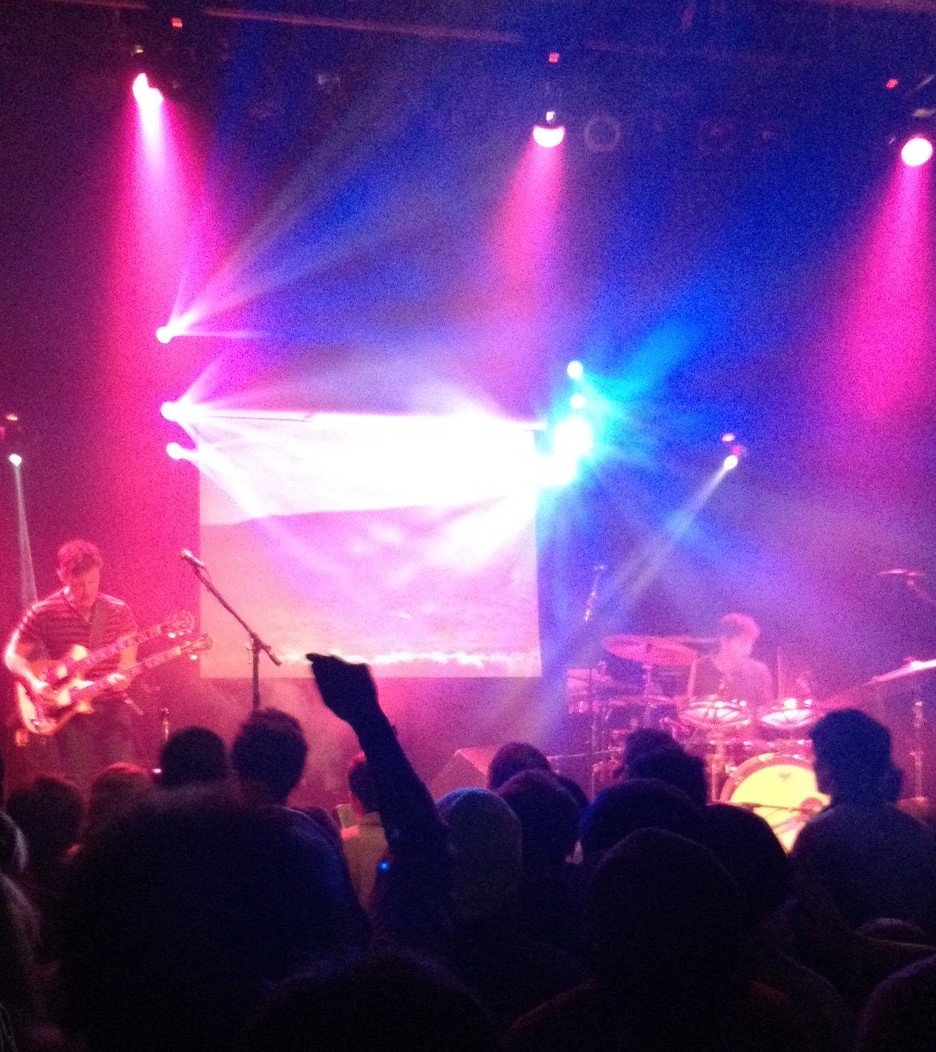 From their more mellow opening tune, they dropped into a fearless rendition of "Jumping Frenchman of Maine," off their 2008 release, These Promises Are Being Videotaped. This, being a well known and quite bouncy tune, set the audience into a veritable wildfire on and off the dance floor. One kid in particular, sporting a messy beard and an awesomely retro Superman t-shirt, sent his arms flailing forward in enthusiastic prayer.
From their more mellow opening tune, they dropped into a fearless rendition of "Jumping Frenchman of Maine," off their 2008 release, These Promises Are Being Videotaped. This, being a well known and quite bouncy tune, set the audience into a veritable wildfire on and off the dance floor. One kid in particular, sporting a messy beard and an awesomely retro Superman t-shirt, sent his arms flailing forward in enthusiastic prayer.
Witnessing these guys put their music together is quite an experience. Somehow, through all the blindingly fast pedal stomping and knob turning, Dunn still finds adequate time to shake his ass like a maniac. The man even breaks out a bass bow to make eerie overtones cascade over the bed of expertly created loops. Meanwhile Fogarty, displaying a more laid back stage presence, lays down synth lines, on top of electric drums, on top of acoustic drums "like a boss." Dunn told us, about halfway through the set, "this is all live, no click tracks, no laptops, no midi." What, do you want a piece of cake? Okay, you probably deserve it.
Anyways, they played two brand new songs, which was quite a treat for all--especially the tune entitled "Transitions." I would say it was the high point of the show. My mind was pretty blown. Dunn warned us that it may take two attempts, and it did, but they handled the retry with such professionalism and finesse that it just ended up being wonderful to hear the intro bass line twice.
El Ten Eleven is a fantastic group. The energy they display on stage makes the show a lively experience for everyone involved. I even noticed a security guard nodding his head while chastising some guy who through his drink into the air. Granted, many of their songs have the tendency to sound very similar, but their overall groove is so unique that gripes like that cease to matter.
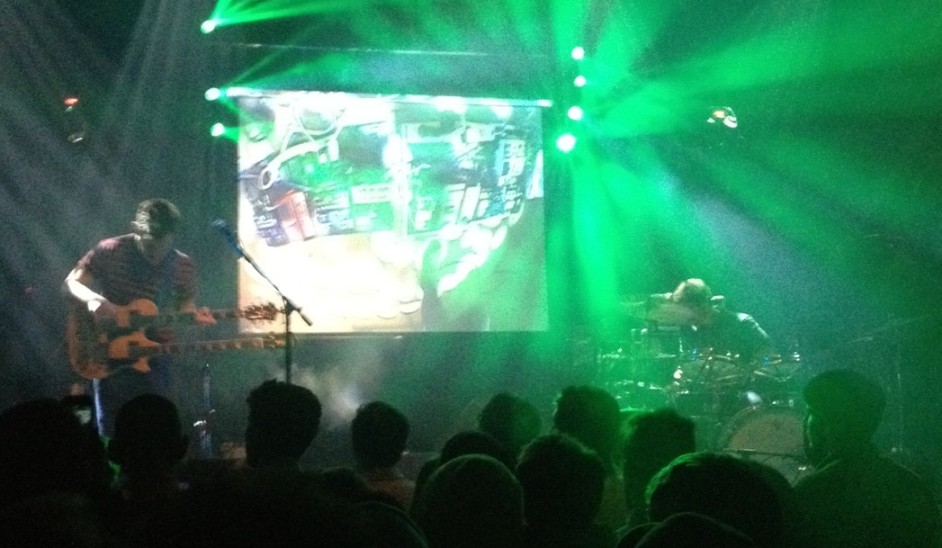 Go see this band, buy their new album when it comes out, and join the hipsters on the dance floor. It’s well worth your time. While any group that can almost fill the Fox Theatre on a Wednesday night deserve some kudos, these guys deserve a lot of kudos. And cake.
Go see this band, buy their new album when it comes out, and join the hipsters on the dance floor. It’s well worth your time. While any group that can almost fill the Fox Theatre on a Wednesday night deserve some kudos, these guys deserve a lot of kudos. And cake.
Highlights: "Jumping Frenchman of Maine," "Anxiety is Cheap," "My Only Swerving," and "Transitions."
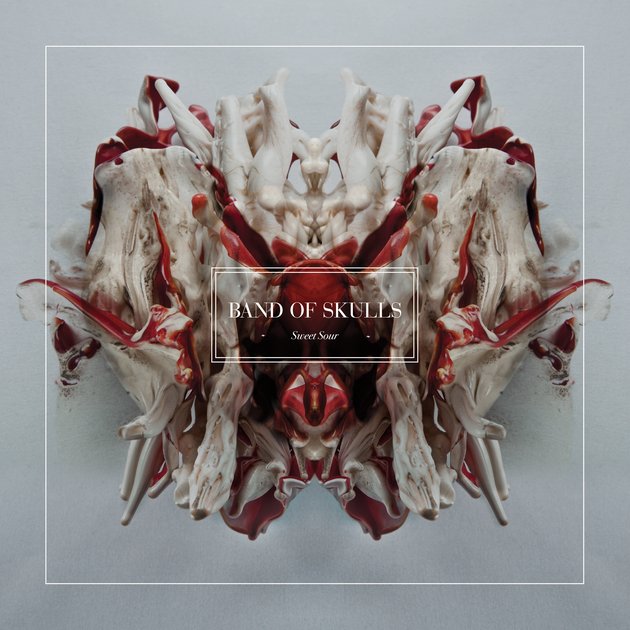
Band of Skull's new record, quite an improvement over their previous full-length album (2009's Baby Darling Doll Face Honey), showcases a more emotional and lyrically complex side of the band. Entitled Sweet Sour, the album lives up to its name. The group mixes hard-hitting, heavy rock and roll with intellectual, soft, at times psychedelic alternative rock songs.The opening track, "Sweet Sour," starts off with what one would expect from Band of Skulls. The song oozes heavy rock, over the top of which Russell Marsden and Emma Richardson weave their voices into harmonic beauty. "Bruises," the second track, is reminiscent of fellow English rockers Radiohead's earlier material, with a twist of female vocals.Here, I'll breeze over specifics in favor of a general statement: the album rocks so goddamn hard it's almost guaranteed to blow your socks right off your feet. The band has become so tight it’s hard to understand how they can squeeze all that sound into a studio. The song “Wanderluster” breaks from the rock and roll norm to provide the listener with a Rush-esque, tentative aura in 7/8 time. All the while, Marsden and Richardson croon together in intersecting majesty, singing, “what you forget, I still remember/far, far away, not long ago.” One must never forget the drummer, though. Matt Hayward is a beast, plain and simple. His sound is a perfect fit for the overall feel of the group. Being a trio, they certainly require nothing sort of solid, deep percussion.Interspersed throughout the heavy songs, as I mentioned earlier, are the softer, more sentimental songs. These, I would say, are the heart of the album. Don’t get me wrong, I like when they get heavy; but I also wouldn’t mind an entire album of just these sorts of songs. The way in which Marsden’s guitar work weaves in and out of the grooves created by Richardson and Hayward is nothing short of sensual.My favorite lyric of the record pops up in one of these songs, called “Hometowns.” It goes (in reference to suburban life): “it’s just kids having kids for fear of being alone.” I don’t usually gush, and hope I can restrain myself just enough not to sound like a fan boy, but that is poetry.I hadn’t heard this band before listening to this album. In doing some research, listening to their older material and such, I thought I knew what to expect. I was pleasantly surprised. Any fan of this band, I believe, will love this album. Albeit a relatively subtle change in sound from their earlier stuff, it is enough to affirm that this is their genuine energy.Oh, by the way, “The Devil Takes Care of His Own” is kind of boring. Let’s forget that one.
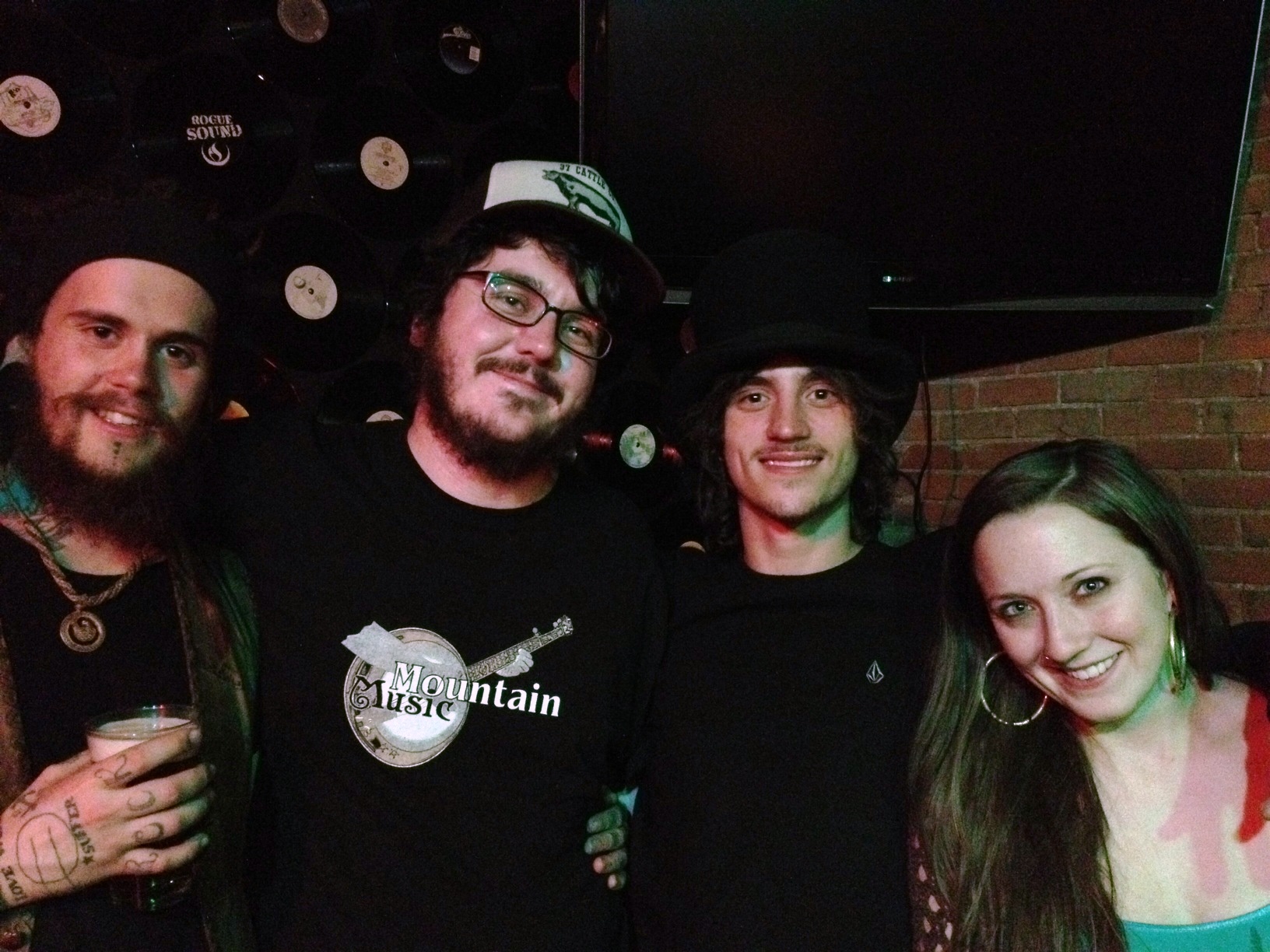
Saturday night, I had the privilege of catching an up and coming Boulder folk band called Gipsy Moon. They combine bluegrass, soul, alternative rock, and a little bit of gipsy jazz, weaving an intricate aura of acoustic song. A friend of mine called me up, telling me that the group was playing at the Lazy Dog on Pearl Street and it was not to be missed. He was right.
They opened up with a waltz-y minor tune called "Vessel." The female vocalist, Mackenzie, sang a perfect harmony to David's lead melody. I was caught off guard, considering the lineup consists of banjo, guitar, mandolin, and bass. I guess I was expecting a hard-hitting bluegrass band, but these guys rip it up in different ways. Don't get me wrong, though, they did what they needed to do as well. Near the end of their two-hour set, they played a great rendition of "Shady Grove," getting everybody in the room on to the dance floor.
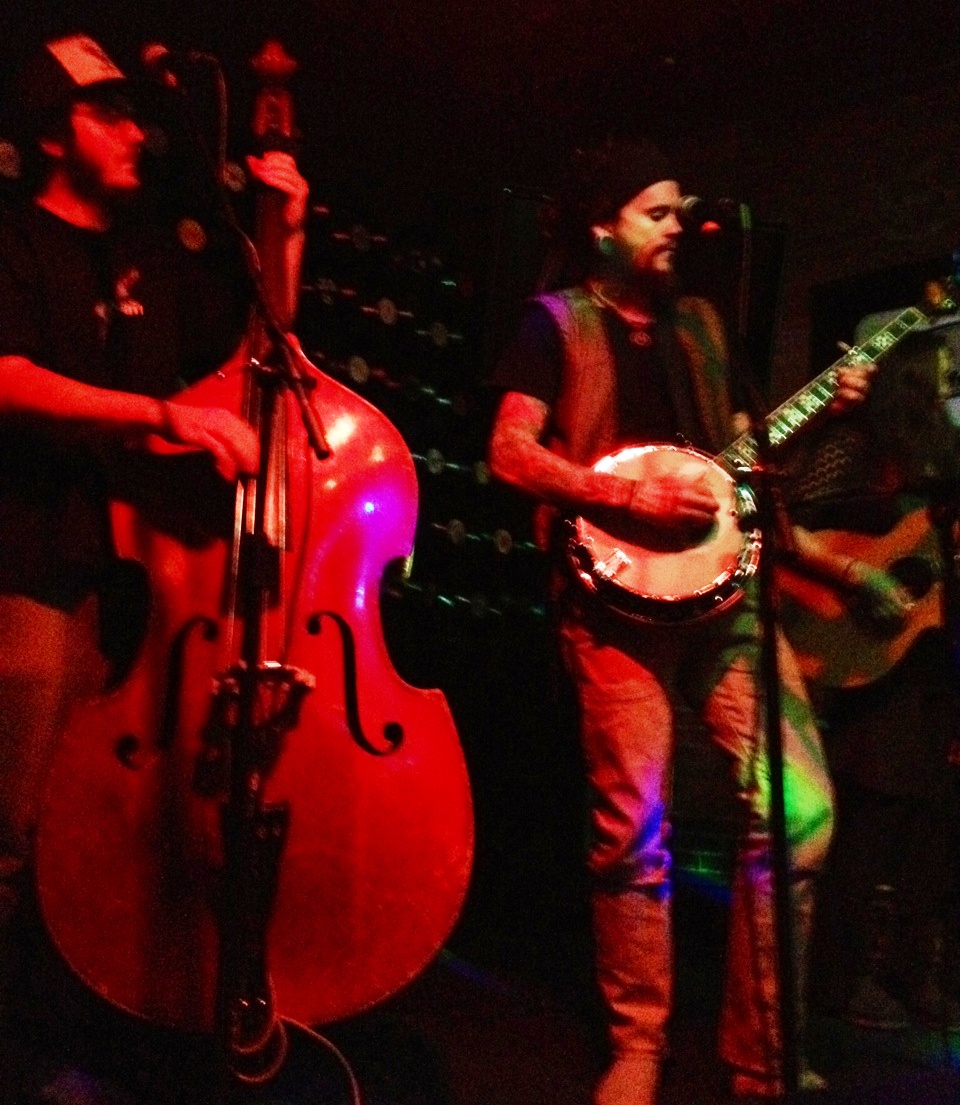 From their bluegrass roots, they expanded into the territory of soul several times, most notably a roaring cover of Nina Simone's "Feeling Good." Mackenzie's got pipes and she showed them off. The band also had some impressive originals. Their bassist, Colin, wrote a doozy of a folk song entitled "Nocturnal." Did I mention that he's not only a fantastic bassist, but also the son of Leftover Salmon's Vince Herman? Did I also mention that the guitar/mandolin player is Vince's other son, Silas? They certainly take after their father's instrumental prowess.
From their bluegrass roots, they expanded into the territory of soul several times, most notably a roaring cover of Nina Simone's "Feeling Good." Mackenzie's got pipes and she showed them off. The band also had some impressive originals. Their bassist, Colin, wrote a doozy of a folk song entitled "Nocturnal." Did I mention that he's not only a fantastic bassist, but also the son of Leftover Salmon's Vince Herman? Did I also mention that the guitar/mandolin player is Vince's other son, Silas? They certainly take after their father's instrumental prowess.
In reference to Silas, one audience member walked up to me, pointed, and said, "he's gonna out-pick his dad by the time he's old enough to drink." I wouldn't doubt it. Vince is one Hell of a picker, that's a fact; but Silas has some extremely impressive chops, on both guitar and mandolin.
From their traditional renditions of the classic bluegrass numbers, to their soulful forays, to their unique sound on their original songs, these guys aren't to be missed. Go check them out. They're on Facebook, and soon their newly recorded demo will be up there for all our listening pleasure.
Highlights: “Vessel,” “Autumn Leaves,” “Nocturnal,” “Feeling Good.”
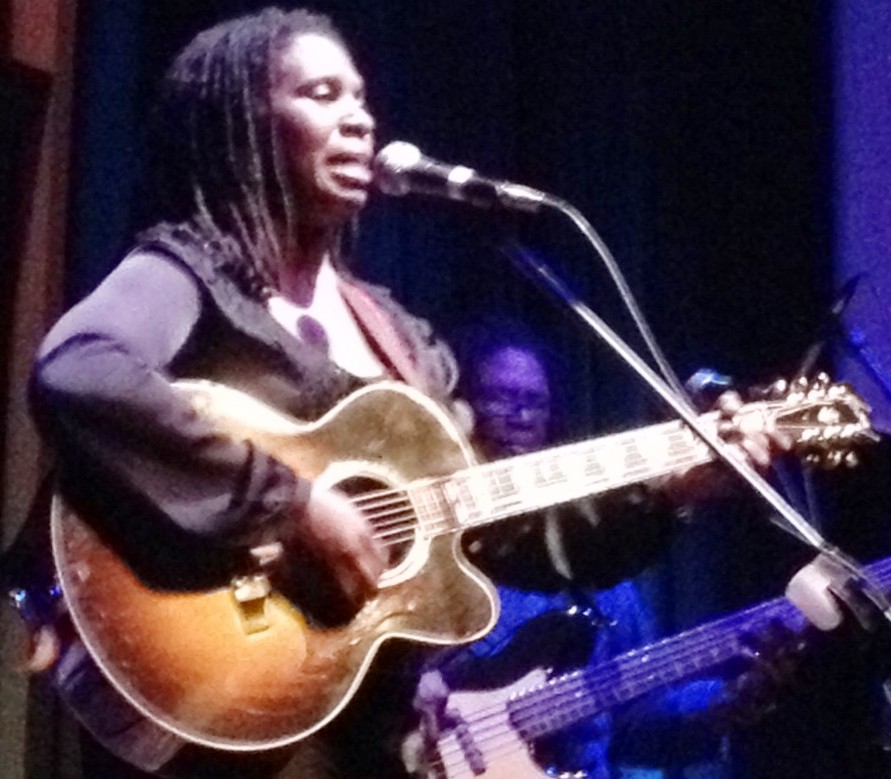
Ruthie Foster and her band put on an interesting show at the L2 Center in Denver this past Saturday. Foster came on the music scene in the 1990s with a powerful and soulful gospel voice, often compared to that of Ella Fitzgerald. Her solo material combines her gospel roots with elements of jazz, blues fusion, and what some may call "adult alternative."
The concert, held in a church auditorium, was performed in front of a sitting audience, with a few daring individuals shaking their proverbial booties on the sidelines, in the aisles. During the opening set, a country-esque showcase of crooning by Paul Thorn, this proved an adequate setting. Thorn, after all, was playing while sitting in a chair. The songs he put forth, being either sentimental or laugh out loud funny, felt at home in a seated venue.
When Foster and her band took the stage, however, there was an awkward disconnect that put the audience and the performers on different levels of understanding. The group opened with a terrific "If I had a Hammer." Its bass line pounded into the walls of the church, Foster's magnificent vocals cascading over the top with a divine quality. Yet the audience was sitting down as if in a theater, or is if they were part of a church congregation.
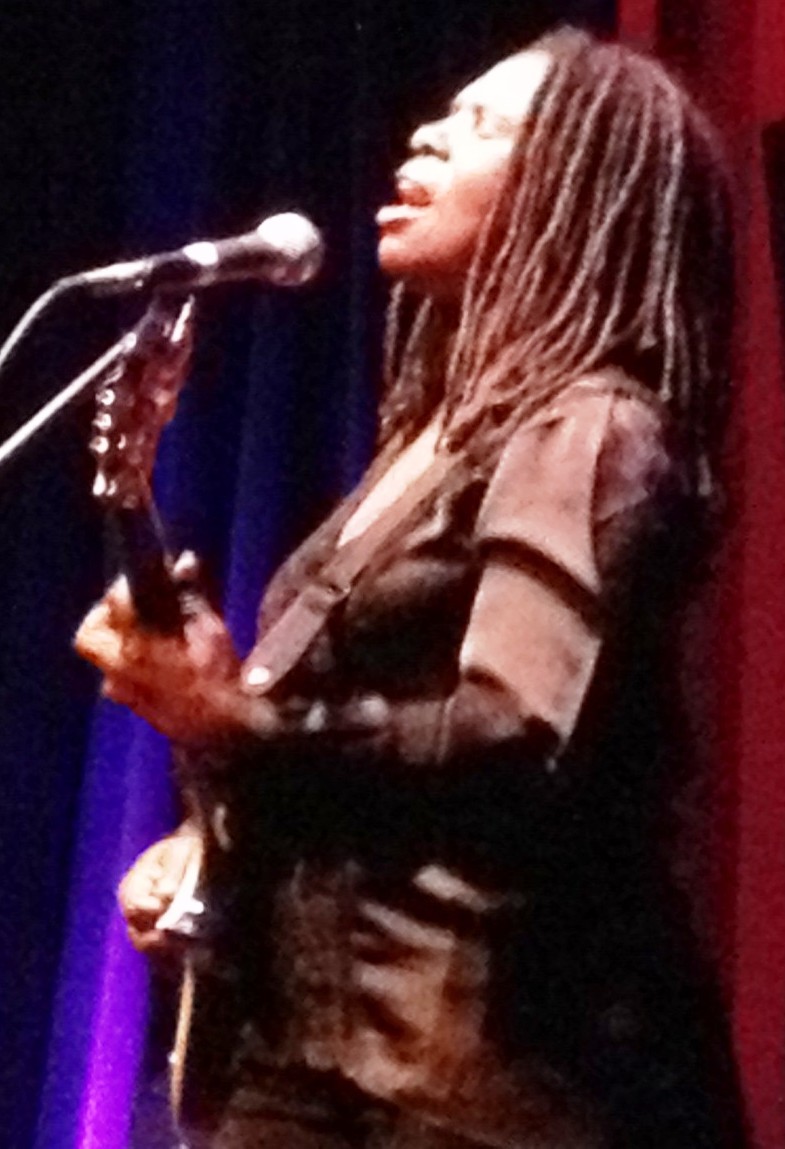 The music continued on from this point, not without energy, but in an awkward listening environment. The highlights of the set tended to be the cover songs, what with the familiarity of them. Foster's originals tended to be pale in comparison. But, being that every rule has an exception, the original tune, "I Really Love You," came booming into the atmosphere with force. This force though, I would mostly attribute to Foster's drummer, Samantha Banks. My, oh my, this woman can hold it down! She is one of the most solid and tight gospel drummers I have ever heard. Her snare tone is spot on, and made the church echo with that old school gospel energy.
The music continued on from this point, not without energy, but in an awkward listening environment. The highlights of the set tended to be the cover songs, what with the familiarity of them. Foster's originals tended to be pale in comparison. But, being that every rule has an exception, the original tune, "I Really Love You," came booming into the atmosphere with force. This force though, I would mostly attribute to Foster's drummer, Samantha Banks. My, oh my, this woman can hold it down! She is one of the most solid and tight gospel drummers I have ever heard. Her snare tone is spot on, and made the church echo with that old school gospel energy.
Still there was the feeling that the band was attempting to make up for some lack of feeling in the audience. Perhaps this is due to the "seated only" environment of the auditorium, or perhaps to some more tangible missed connection.
The best part of the show, in my opinion, was the masterfully articulated accapella number, "God Moves on the Water," another cover. Ruthie Foster has a truly phenomenal gospel voice. It booms out of her with such force as to send shivers down one's spine. I certainly felt as though she showcased a skill and professionalism in her vocal delivery that stands on par with Aretha Franklin.
What she may have missed out on, though, is the equally booming stage presence. Foster makes a valiant effort to play the part of the band leader, as the name ("Ruthie Foster") her band goes by suggests, but still the overwhelming feeling is that every member of the group functions at the same level of importance. That is fine, of course, there is nothing wrong with that, but such a band may not want to go simply by the name of the front woman.
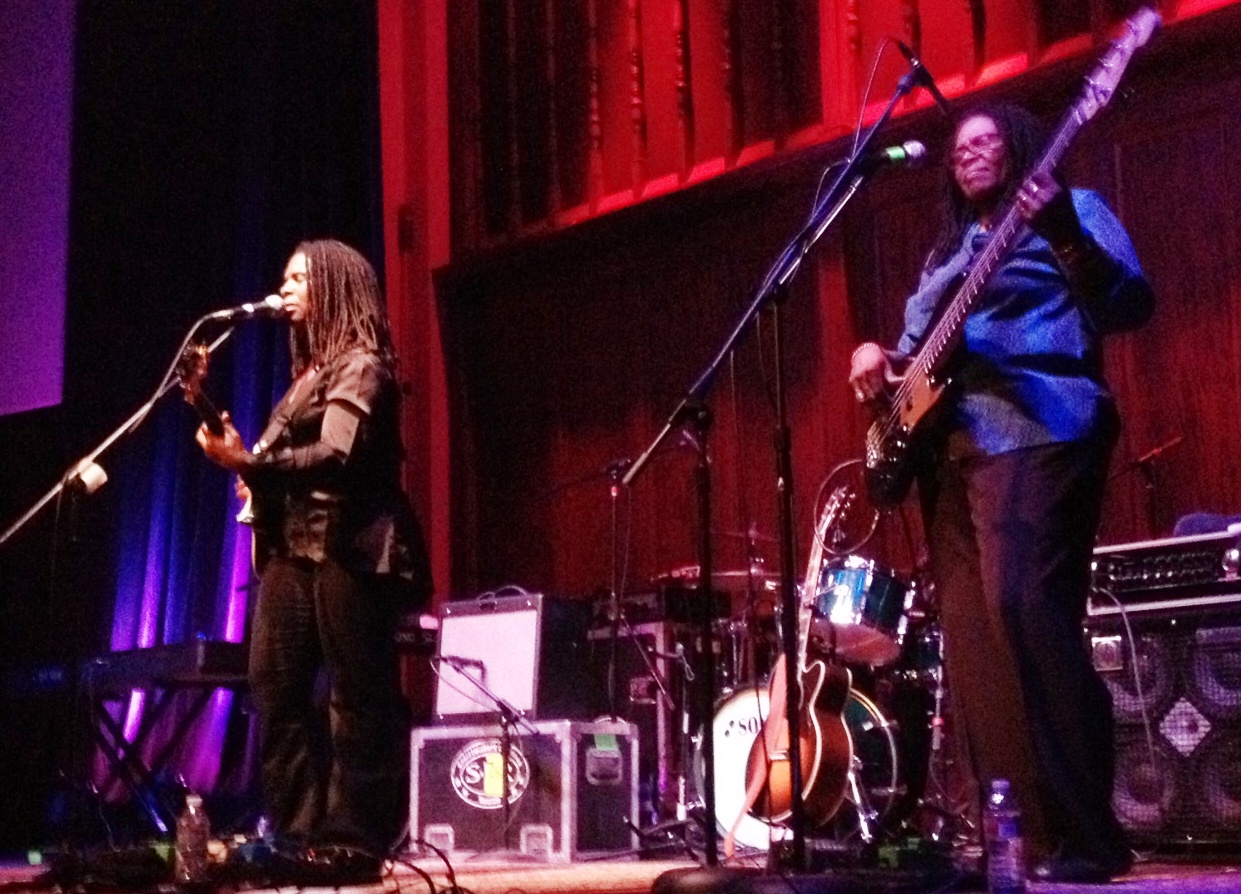 The music Saturday night was very enjoyable. There was that disconnect, and it never quite went away, but if you desire a nice, laid back, yet powerful gospel experience, pounding drums and all, Ruthie Foster and her band should be number one on your list.
The music Saturday night was very enjoyable. There was that disconnect, and it never quite went away, but if you desire a nice, laid back, yet powerful gospel experience, pounding drums and all, Ruthie Foster and her band should be number one on your list.
Highlights: “If I had a Hammer,” “I Really Love You, “God Moves on the Water,” “Ring of Fire”
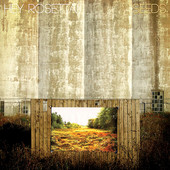
Canadian rock band Hey Rosetta!'s third studio album, Seeds continues the vibe the group started back in 2005. They certainly take a leap forward in their production, however, as the sounds found on this album are far more multi-layered than their previous material. Take the opening track, "Seeds," for instance. It begins with a complex sounding guitar mix with many intertwined levels, then breaks into an upbeat rock hook with synthesized claps. One might think that the band bit off a bit more than they could chew at this point, but they seem to ride the wave with precision, even when the music spontaneously switches into a "Kid-A" style electronic break down.What follows is a well orchestrated, emotional tune called, "Yer Spring." Tim Baker's lyrical style and delivery has come a long way in the seven years since the band's formation. His voice mixes Thom Yorke, Chris Martin, and Sea Wolf's Alex Brown Church. I would in no way suggest that Baker's voice is anything less than his own, but shades of these other musicians can be found in his intonation, which I think shows improvement over his work on Plan Your Escape and Into Your Lungs. He sings, "I feel the light and I'm ready to be out in it." He certainly brings his talents into the light quite impressively on this release.The highlight of the album for me is the fourth track, "Bricks." It is a sentimental tune in which Baker again showcases his vocal adeptness, supported by an extremely interesting guitar riff that cascades over an ethereal aura created by the syncopated drum beat and electric guitar noodling. The tune makes me think of Radiohead once again as it plunges, as if over a waterfall, into a soaring legato bridge. This is a track worth listening to over and over again.Unfortunately the next song, "New Sum," is kind of weak. It has a sort of reggae pop feel to it that falls short of adequate. In fact, all three songs after "Bricks" blend together in comparison. The next big tune, though, entitled "Yer Fall," brings the smile back to my face in a big way, what with its bleeding heart crescendo as Baker belts, "I'm not coming out." Another song to love.The deluxe LP version of this album, coming out in the U.S. on May 1st, ends with three acoustic cuts ("Young Glass," "Welcome," and "Seventeen"), all of which are way cooler than the original album versions. I don't know what this says about the band, but it says a lot about the power of simplicity. I guess it's up to each individual listener to decide what they'd rather hear.
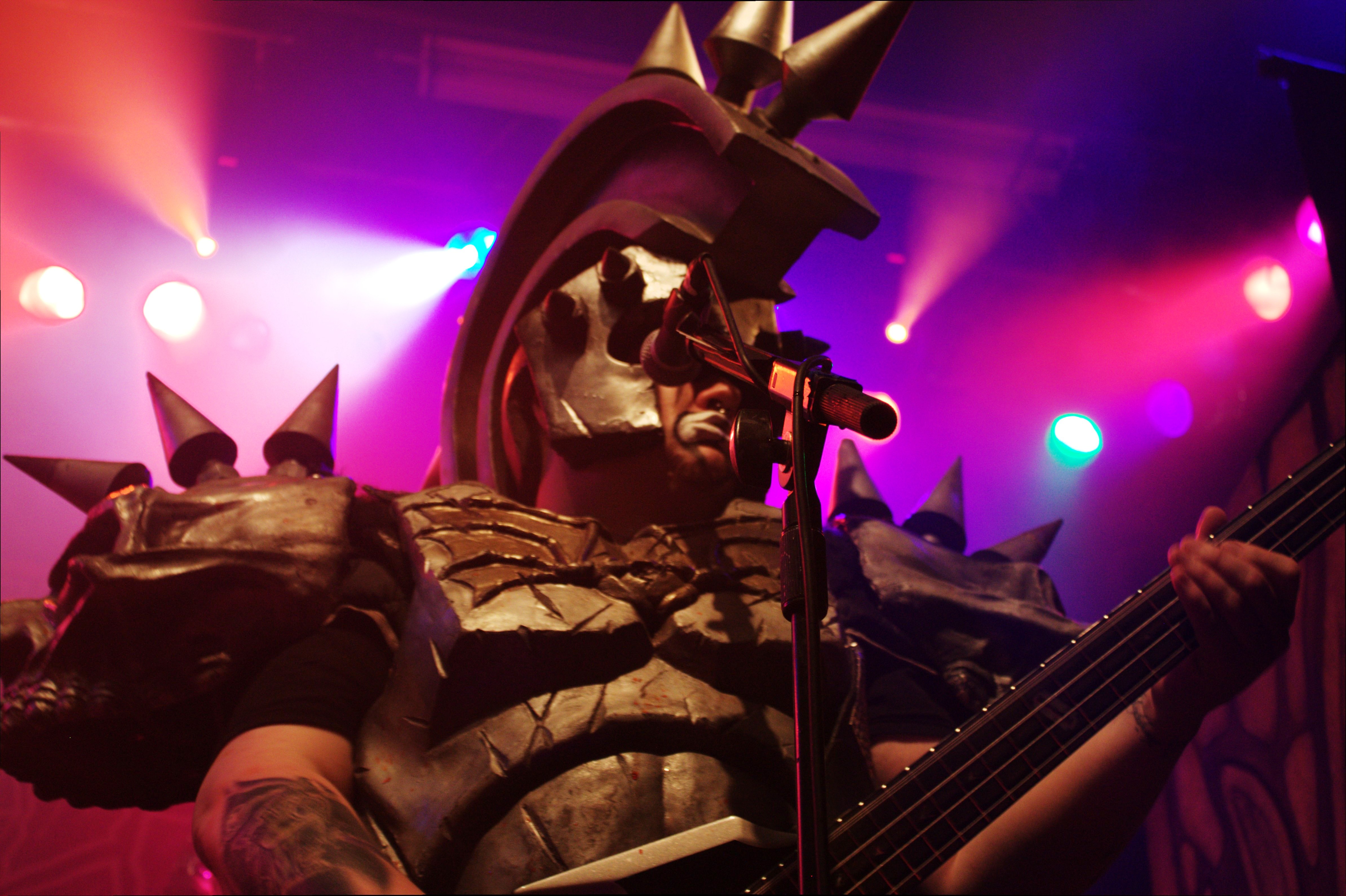
The transformation is complete. I now believe. All hail our extra-terrestrial overlords! The Marquee read "GWAR." It was dark when I arrived, when I took my place in the line of crust punks and metal heads stretching over fifty feet out from the box office. We who were not already inside were salivating in anticipation for the ritual blood bath to come.
The history of GWAR is the history of the human race. Eons ago, the monstrous creatures of GWAR were banished to our insignificant planet. Here, they spawned the human population by taking the ancestral beasts of Earth into their foul beds by force. It was only in 1984, when they came out of dormancy to show us what real heavy metal is, that we came to realize their awesome and sublime power. Richmond, Virginia will never be the same. Indeed, the world may never recover.
After a mind-blowing session of metal music provided by the three opening bands, Legacy of Disorder, Ghoul, and Municipal Waste, the lights dimmed and a cloaked figure took the stage. He was Death and he read his decree of damnation. Only when the lights came up to reveal our courageous and all-mighty alien rulers, splendid in their glorious monstrosity, did the dark figure cower, perhaps over taken by Oderus Urungus’s intimidating, green, and exposed phallus. The show then started with nothing short of a bang. The minions of GWAR promptly severed the head of the cloaked zombie-Death, spraying its arterial blood all over the eager listeners. My God, this band is loud. The sound seemed to come from all angles--the walls, the ceiling, the floor, everywhere. Everything was vibrating with brutal force. Oderus’s guttural voice then boomed out across the theatre, telling of death, chaos, and destruction. The crowd roared their applause at the end of the first song so that the noise was ceaseless until the start of the second.
 During the chaos that ensued, Oderus Urungus was given two stillborn babies, on whom he feasted, spraying more blood into the mosh-pit. My God, this band is offensive! The Ultra-violence! I had heard of GWAR’s on-stage antics before, but I had not come prepared for the extent of brutality I witnessed. After an ass-kicking rendition of their horn-section driven song, “Saddam A Go-Go,” the band brought to the front of the stage what could have only been the real Nicole “Snooki” Polizzi and eviscerated her flesh! Right there in front of the hoards of followers, they did her in and took her unborn child to their dark underworld.
During the chaos that ensued, Oderus Urungus was given two stillborn babies, on whom he feasted, spraying more blood into the mosh-pit. My God, this band is offensive! The Ultra-violence! I had heard of GWAR’s on-stage antics before, but I had not come prepared for the extent of brutality I witnessed. After an ass-kicking rendition of their horn-section driven song, “Saddam A Go-Go,” the band brought to the front of the stage what could have only been the real Nicole “Snooki” Polizzi and eviscerated her flesh! Right there in front of the hoards of followers, they did her in and took her unborn child to their dark underworld.
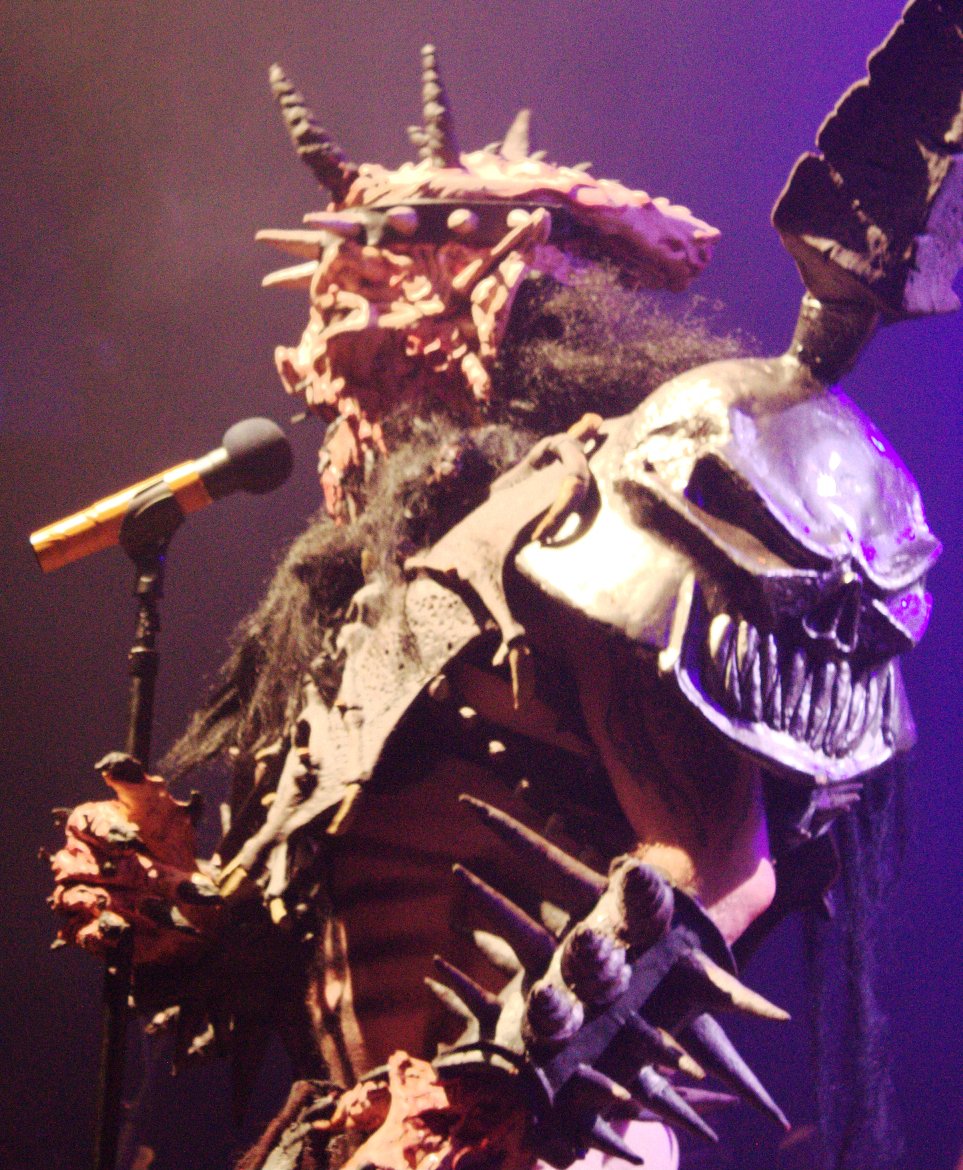 Urungus himself looks like he may have come from this same underworld, what with his face resembling that of an alien burn-victim. His body, though, is protected by towering spiked pauldrons (shoulder-pads shaped like skulls). To his sides stand Balzac The Jaws of Death, on guitar, whose bear-trap facemask supposedly hides a visage made entirely of unmentionable skin, and Beefcake the Mighty, on bass, a towering gladiator who looks like he came from some off-world fighting pit. Backing the tremendous power of the stringed instruments and Urungus’s badass vocals, Jizmak Da Gusha sits behind a Babel-esque drum set, his bloody dog-head giving us a glimpse into his animal brutality. All around them, running about the stage sowing chaos, are their minions, half naked body-builders masked in metal helmets.
Urungus himself looks like he may have come from this same underworld, what with his face resembling that of an alien burn-victim. His body, though, is protected by towering spiked pauldrons (shoulder-pads shaped like skulls). To his sides stand Balzac The Jaws of Death, on guitar, whose bear-trap facemask supposedly hides a visage made entirely of unmentionable skin, and Beefcake the Mighty, on bass, a towering gladiator who looks like he came from some off-world fighting pit. Backing the tremendous power of the stringed instruments and Urungus’s badass vocals, Jizmak Da Gusha sits behind a Babel-esque drum set, his bloody dog-head giving us a glimpse into his animal brutality. All around them, running about the stage sowing chaos, are their minions, half naked body-builders masked in metal helmets.
From a band with such an intimidating, often times terrifying, stage presence comes awesome and powerful metal music. One might not expect such a gross and offensive group to produce truly rad and genuine music, but one might be pleasantly, if not horrifyingly, pleased. Indeed, if the music were not this f*cking cool, GWAR may not have the dedicated and huge following that they do. The show was sold out, the venue packed with crazed underworlders. Even after losing a member (Flattus Maximus died in November of 2011) the band still provides their fans with the same level of brutal energy. This display of force was evident when the group went into one of their most famous songs, “Sick of You,” and the crowd went insane with praise. It was praise not only for GWAR, but for the Flattus’s (Cory Smoot) memory.
 Toward the end of the show GWAR showed a sentimental side I didn’t expect. They dedicated two songs to their “fallen brother,” an act which got the crowd chanting “Flattus, Flattus!” to bring the band out for an encore. After the encore, while the immense crowd shuffled out of the theatre, a recording of “My Way” by Frank Sinatra played over the house speakers, reminding us all that Flattus lived by the beat of his own drum.
Toward the end of the show GWAR showed a sentimental side I didn’t expect. They dedicated two songs to their “fallen brother,” an act which got the crowd chanting “Flattus, Flattus!” to bring the band out for an encore. After the encore, while the immense crowd shuffled out of the theatre, a recording of “My Way” by Frank Sinatra played over the house speakers, reminding us all that Flattus lived by the beat of his own drum.
It was only when I finally got outside that I noticed that the vast majority of the crowd, despite being drenched in blood, were smiling as big as the Cheshire Cat.
Highlights: “Saddam A Go-Go,” “Immortal Corruptor, “Sick of You.”

I arrived before the doors opened. Just from the line forming outside the theater, I could tell that Band of Skulls had an enthusiastic following. The excitement was palpable. After the recent release of their new album, Sweet Sour, the band geared up for an international tour. The group, hailing from England, obviously had quite the draw in America. The show was sold out, and in a small venue like the Bluebird, that meant sweat, heat, and closeness only a mother could love.
The opening band, We Are Augustines, started the night out with an almost tangible energy, leaving the crowd primed for the main attraction. Band of Skulls came on the stage after a half-hour intermission. The lights dimmed; a blue aura came over the ambience. One by one, from the side of the stage, the group came into view. Upon taking their places behind the microphones, Russell Marsden and Emma Richardson immediately encountered volume issues in the stage monitors. Considering we had already waited 30 minutes for the band to take the stage, this was disappointing. This sort of problem should have been dealt with during the sound check, not during five awkward minutes at the beginning of the set.
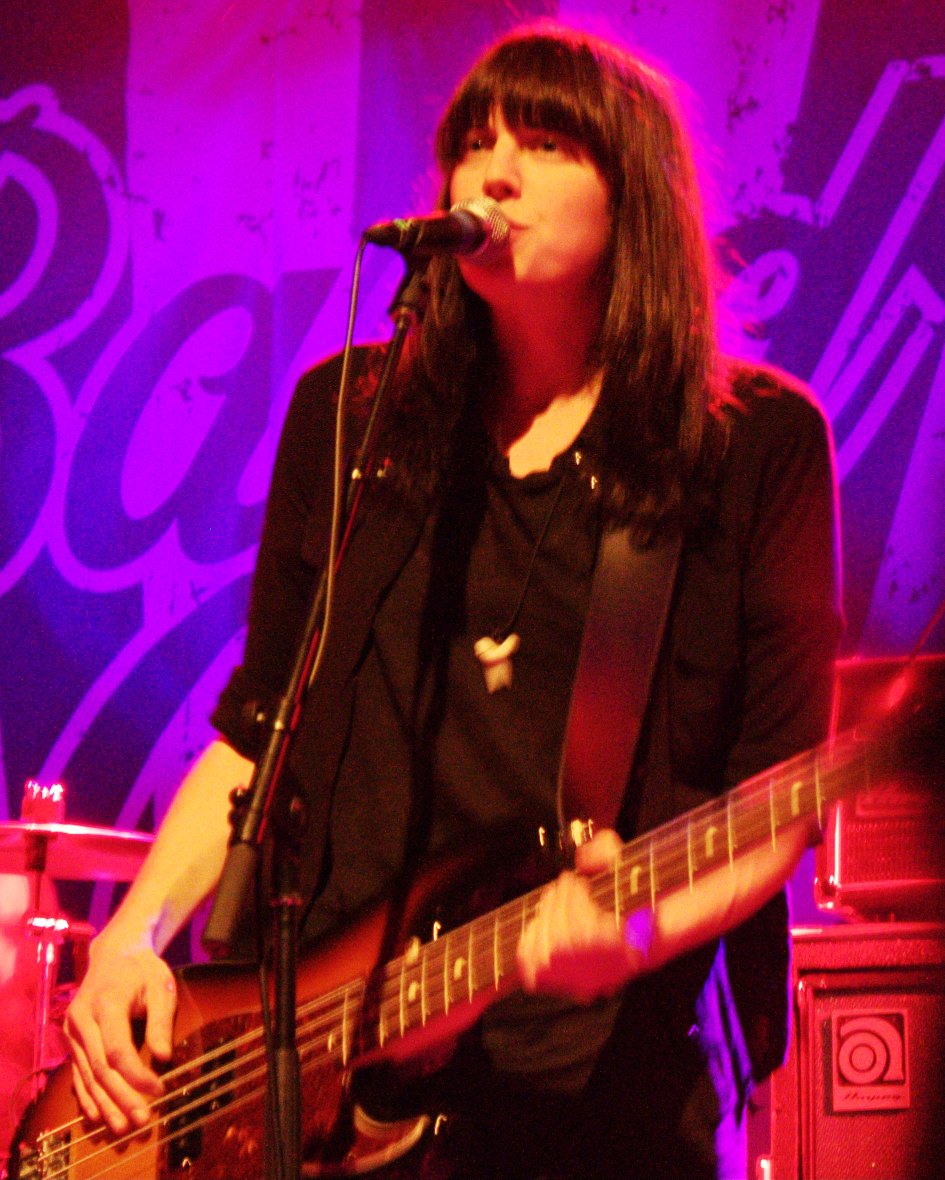 Delay aside, Band of Skulls got going with a rip-roaring rendition of the title track off the new album. Having already heard the album version many times, it was nothing short of awesome to listen to the band creating those same sounds live. These guys have the potential to rip some faces off. Their sound, a mix of T-Rex distortion and Black Keys style blues, tore through the small venue like lighting. The crowd roared. From here, the energy went up and up, from heavy to heavier. I never would have guessed how raw and gritty the band's live sound was. Marsden, like a veritable boss, tore into his Fender Jaguar with a force resembling Jack White. His solos had impeccable tone while using that guitar. For the more traditional blues songs, he switched over to a Gretsch hollow body, which altered his tone from a crunchy, rock sound, to a more mellow, tube-distorted Chicago blues sound.
Delay aside, Band of Skulls got going with a rip-roaring rendition of the title track off the new album. Having already heard the album version many times, it was nothing short of awesome to listen to the band creating those same sounds live. These guys have the potential to rip some faces off. Their sound, a mix of T-Rex distortion and Black Keys style blues, tore through the small venue like lighting. The crowd roared. From here, the energy went up and up, from heavy to heavier. I never would have guessed how raw and gritty the band's live sound was. Marsden, like a veritable boss, tore into his Fender Jaguar with a force resembling Jack White. His solos had impeccable tone while using that guitar. For the more traditional blues songs, he switched over to a Gretsch hollow body, which altered his tone from a crunchy, rock sound, to a more mellow, tube-distorted Chicago blues sound.
As I expected from the group's recorded sound, the drummer, Matt Hayward, deserves some major props for his ability to provide a solid foundation on which Richardson and Marsden can rock. One of my favorite moments of the night was when the band played their song "Wanderluster." The tune is built on a 7/8 rhythm, which Hayward held down expertly. They ended the song in a cascade of energetic sound, the drums rolling, bass thumping, guitar wailing. It was the kind of triumphant song finale one might expect from an old school rock band. It was cool. The first time. Then they did it on the next song, and the next, and the next. I lost count at five. It was kind of silly, the way they ended with an over-energetic bang so many times. They didn't need to do that. They are a good group, their songs are enough. It can be over-bearing when a band ends every song with a finale. It's like a fireworks show that blinds everybody.
Don't get me wrong, though. Band of Skulls delivers in a big way. The band rocks. If you like the sound, see them live. You will not be disappointed.
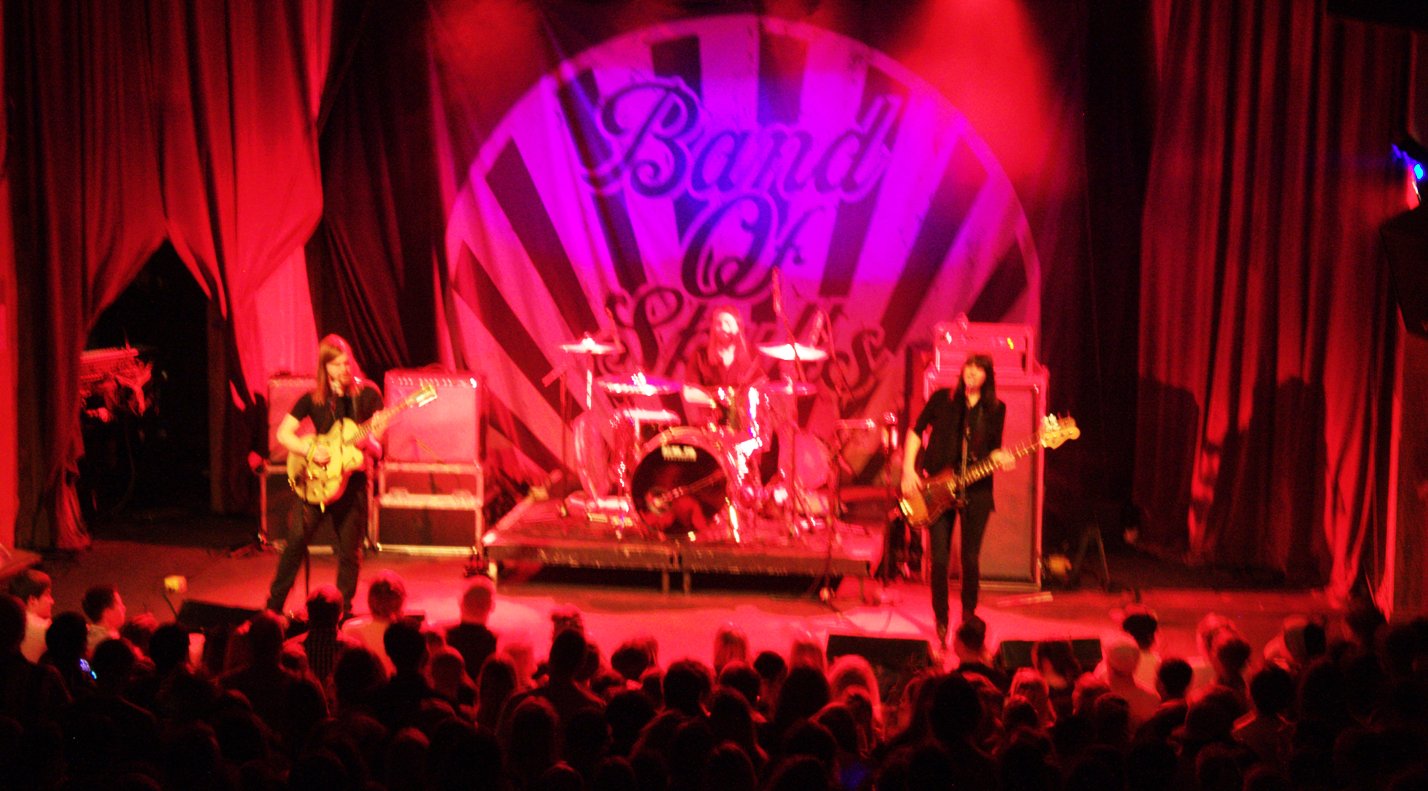 Highlights: "Sweet Sour," "Wanderluster," "The Devil Takes Care of His Own."
Highlights: "Sweet Sour," "Wanderluster," "The Devil Takes Care of His Own."
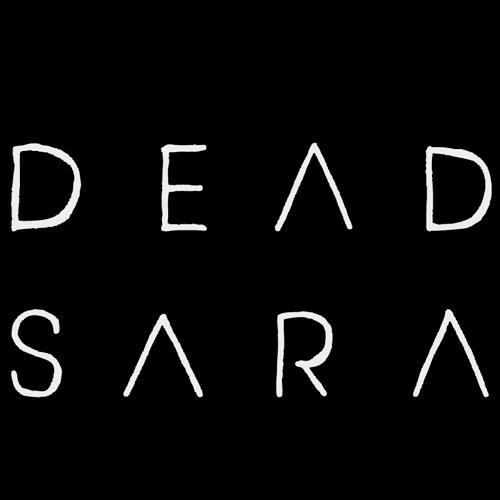
The band Dead Sara released their self-titled album on April 10th. Based in Los Angeles, the female duo-fronted band weaves together a stiff, punk attitude with a grungy rock sound. Their sound sometimes reminds me of a heavier Hole, what with Emily Armstrong's edgy vocals mixing with the solid rhythm lines provided by guitarist Siouxsie Medley. Might I take a moment here to comment on the guitarists name? Okay, there are no Banshees in the band, nor any of the Banshee attitude that should accompany a moniker like "Siouxsie." I have a major problem with this name. It's like Avenged Sevenfold's "Zacky Vengeance" trying to pretend he's never heard of Davey Havok.That being said, the album is perfectly fine. It's like if you're in a supermarket, and they're out of Coke, Pepsi will do. It's cold, brown, and does the job. When you've listened to the Audioslave CD in your car too many times to want to hear it anymore, give Dead Sara a try. They'll provide a 43-minute long respite.In all seriousness though, the first song, "Whispers & Ashes," starts the album with a wispy, distanced bass line that creates a mysterious aura, until Armstrong yells something that sounds like "shout" or "shut" to usher in the rest of the band. When she begins the first verse, the guitar switches modes from a chordal crescendo to palm-muted version of the same melody. It lacks continuity and complexity, not to mention lyrical coherence. The first lines go, "so once again, come follow me/to my grave, a distant family/shattered bruises and shattered words/is your saving grace in vain." This seems to be a hodgepodge of words that continues in the chorus with, "whispers and ashes, behold/whispers and ashes, hold on." The groove in this song isn't bad, really. There are just too many elements that the band does not pull together properly. Their sound just isn't unique; it verges on boring. The attempts to spice things up, like Armstrong's lilted "woo" to transition from the chorus back to the verse, just seem silly.That being said, though, Armstrong is a great singer. She hits all the right notes spot on, yet the quality of her voice loses its flavor when she is yelling, and she yells a lot. The music is often too heavy to carry her sound in the way it deserves to be carried. There are three songs on the album that I think highlight the complexities of her voice: "Dear Love," "Face to Face," and "Sorry for it All." These are good songs. They are sung well and they allow Armstrong to showcase her awesome pipes in the setting they were made for. All three songs are slower, with more mellow music, not without their rock flair, but with a genuine subtlety that makes them actually pleasing, rather than forgettable.The best part about this band is Emily Armstrong. I find myself wanting to hear her voice more and more, and the music less and less, though probably not at all.
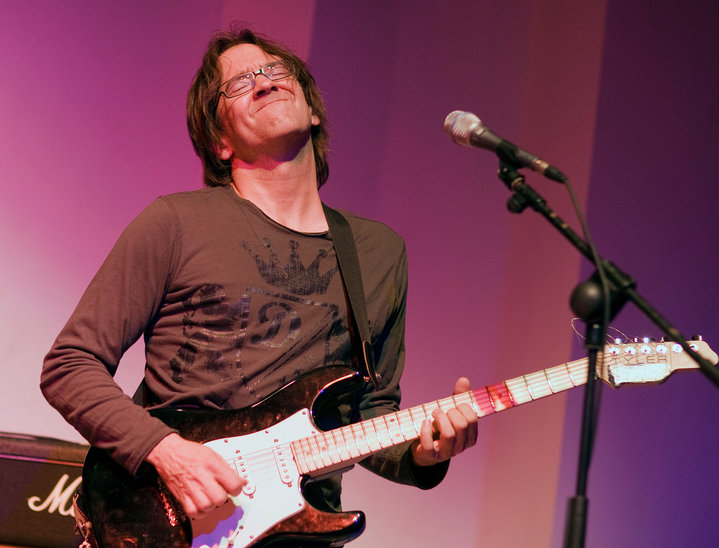
Grateful Web recently got the chance to sit down with jazz guitar player Wayne Krantz. We talked about his upcoming summer tour, the sound of his new album, Howie 61, and the relationship between composition and improvisation.
GW: So I know you're getting ready for a summer tour in Europe. What are you and your band doing to prepare?
WK: For me, it's just figuring out how to arrange this music I recorded on the latest record, Howie 61. How to arrange that in a way so that a trio can play it. I mean, the orchestration for that record involves more people, and different sorts of people for each track depending on what the nature of the track was. And I want to play music from this new record, not rely on stuff that was made for a trio, so I need to figure out how to bring that in. That's the challenge: to figure out how to do that with somewhat limited resources. Touring, for me, is a fairly modest thing. It's on a smaller scale. We don't carry a lot of our own gear, and it's a small group, so it just requires some creating thinking to figure out how to cover that in a way that's fun do to and works with the little guerilla unit that we take out.
GW: In relation to your live sound versus your studio sound, how do you compensate between the two with your guitar? Should we expect rehearsed tracks or a 15 minute improvisation on a 5 minute song?
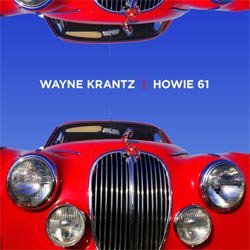
WK: Live, it's almost all improvisation. For the last ten years, and really since the beginning--well, at the very beginning I was writing a lot of composed stuff, that was the mid-nineties--but since then it's become almost completely improvisational. We basically improvise for two hours when we play. There's always songs, always bits of composition floating around, but it's primarily been twenty minute versions of songs that on record were already eight or nine minutes long. That's been the drive for this thing for a long time. This last record, Howie 61, is a departure from that. It's the least improvisational record I've made in probably fifteen years. So that's part of the question. I would never want to give up improvising live because, for me, that's where the action is. But I have to reconcile with the fact that on this last record some of the songs are only two an a half minutes long. And the question is: do I want to blow everything up to be another twenty minute long improvisation? Because I could. Or do I want to follow the direction that the record is taking me? I have to reconcile the two live, while not giving up the improvisation, because I figured out years ago that that is the fun thing to do. It's great to play parts over and over again, but at that point it just becomes like classical music. I mean, that's what those guys do. They enliven stuff that was sometimes written hundreds of years ago. So that becomes the task: can they animate it? Can they make these notes on the page breath? I'm up for that to some degree, but there’s always going to be improvisation, it's just a matter of figuring out the balance. I think the way I'm going to do it is to play more songs. Instead of playing eight songs in two hours, maybe I'll play sixteen songs in two hours. And some of those songs won't be blown up into twenty minute jams, and some will. So that way I'll get both angles.
GW: Being that Howie 61, you said, has been your most compositional record, what was the studio experience like? Did you and your band go in and write the songs, or did you have compositions pre-planned?
WK: [Writing the songs in the studio] is something only a real band can do, people that have been together for a while, that have the luxury of sitting in the studio for days and weeks on end. They can do that, sit around and jam and try to come up with stuff, hone it, and make it sound like it's composition. On the last record that I made, Howie 61, those are side-men. I mean, those are people that I know have worked with in my band, but there's eighteen people on that thing and I don't have the luxury of sitting in a studio for days and weeks on end. And even if I did, then it wouldn't have my intention in it, and I had a really clear picture of what I wanted to do. It required me sitting down and composing the session long before it happened. Some of those guys were only available for two or three hours, so there’s no time to sit and say "okay, what do you want to play?" Most of that stuff was written within four months of the sessions, and then the sessions spread out over about six months in three cities. We recorded it in New York, L.A., and London. I enjoy being in the studio as much as I enjoy playing live.
GW: You had mentioned two different musical aspects of yourself: the compositional, and the improvisational. Which of those sides did your time at Berkeley School of Music foster most?
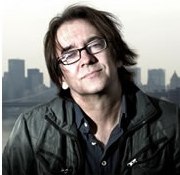
WK: It didn't have anything to do with me as a musician, as it turned out. It was just something to do after high school. My parents wanted me to go to college, I wanted to play the guitar, so I went to music college. And that was one of two that existed at that time with any note, and so I went. Granted, the whole educational system of music has gotten a lot better since then, but I have never used anything I learned at that school as a composer or an improviser. Everything that I use happened after that. I think that college, for me, was a safety net. And I think it still is for a lot of people. It's just that now, the business of music education is booming and there's a lot of good teachers out there, and you can learn a lot of valuable stuff, but that wasn't so much the case when I was going. Music is a spiritual, soulful thing. It's really not something that is taught at a school. I can't think of anyone who became themselves from going to college. It sort of doesn't work like that.
GW: In contrast to an earlier album of yours, Greenwich Mean, it seems that Howie 61 has more traditional jazz and blues influences. Where Greenwich Mean is more heady and psychedelic, Howie 61 seems to go back to the roots of American music. What would you say about that relationship between the two?
WK: The Greenwich Mean was a sonic sculpture. I took a hundred hours of live recording and fed it into the computer and started editing. I edited for a year and kind of created the sculpture that is Greenwich Mean. A lot of that record never happened. A lot of it is construct. A lot of it is editing. So the Greenwich Mean was really just a take I had on what we were doing live at that time, which was very, very improvisational. That was ten years ago. A lot has happened since then. That band on Greenwich Mean--the improvising that band did changed a lot, and I got a lot more into rock, I think, as a guitar player, after that record. And now fast forward X number of records and X number of years to Howie 61, and it's not just a bunch of live recording that I'm going to take home and edit. It's actually sessions that happened with other musicians, and songs needed to be written. I kind of picked the most basic form that I could to try to put my message out there. I could have done a highly experimental, sonic, electronic dance groove record, because I also like that, but I've already done stuff like that live. What I hadn't was make a little bit more straight forward record, in terms of the groove, with maybe some blues elements and rock elements, but along with some other stuff. I mean, it's not a Joe Bonamassa record. There's still some different sounding, experimental stuff on Howie 61, but it does have that undercurrent you're talking about, and I think it's because this is really the first record I've ever made that has that much vocal content, and that much lyric content. I think, in a way, this is sort of ground zero. This is sort of a starting point, even though it's the ninth record I've made. This is kind of the beginning of a direction I'm taking, and I just needed to make something basic and fundamental for that first step. It's kind of a rootsy record, or what my version of what a rootsy record would be, and I see that as a beginning. From there I think I have a lot of directions I can go, and I hope I have the chance to follow that up.
GW: Thanks very much for your time.
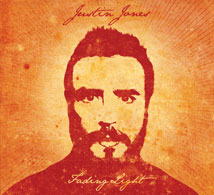
Justin Jones' new album Fading Light is an Americana opus, full of deep emotion, musical mood swings, and heartfelt playing. The album opens with a choral intro track entitled "Ghosts," which sets the mood for the first song, an ambient rock tune called "As It Turns Out." Jones croons "the money's gone, future too/many lost, in the name of few" over a cascade of vocal harmony and an organ-driven rock foundation reminiscent of the later Allman Brothers Band. His voice is full of feeling. It is at times rocky, at times smooth, yet always fitting in well with the aura his band creates.The following tune, "My Father's Gun," begins with a delta blues-esque, slow and creeping mood. It then explodes into a full force blues rock song. I could do without that transition. Don't get me wrong, the song is good, but that moody and dark introduction ends too quickly for comfort. The album continues on with a mix of that same dark, bluesy, environment and a lighter side, consisting of percussion-driven rock songs. At times, the switch from one mood to the other can be the slightest bit jarring, but Jones always then brings the ambience back home with his consistent vocal talent.The highlight of the record, for me, is a slower acoustic song entitled "Christmas Night." Sometimes I am caught unawares with a lump in my throat. Listening to this beautiful ballad for a past lover was one of those moments. Jones sings, "you held me close, with the stars above/we were too young then to know of love." This man can write. Another great moment comes along in the form of the closing track, "You Saved Me." I finished listening to the song, then looked down at my notes. I had only written one thing down for the track: "damn good song." I guess that about sums it up. It is indeed a damn good song, and the album is a damn good album.In a world of consumer pop and rock music, it is nothing short of refreshing to hear a talent like Justin Jones. He isn't afraid to bear his heart in his music. Hopefully he and artists like him teach us all that fortune should favor the genuine.
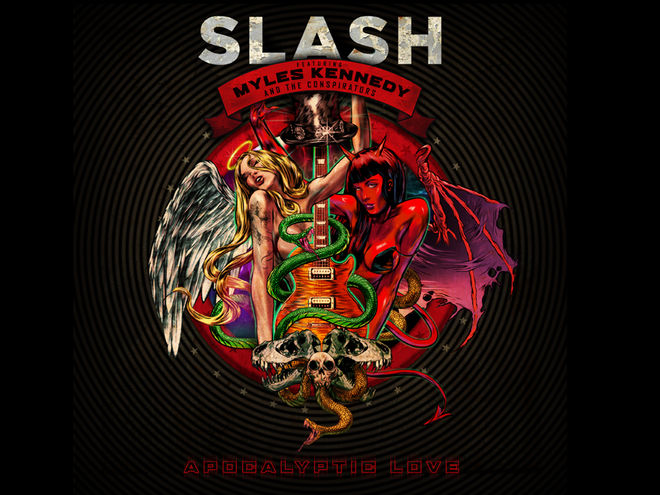
On his second solo release, entitled Apocalyptic Love, Slash shows us that he can still shred the guitar like a beast. Did we ever have any doubt? From Guns N' Roses to Velvet Revolver, the man has expertly showcased why he was chosen as runner up in Time's "The 10 Best Electric Guitar Players." His solos and riffs are legendary, and he has become one of the best known guitar acts internationally.The album comes out strong right from the start with the hard-hitting title track, Slash's melody soaring over a well put together foundation provided by his band Myles Kennedy and the Conspirators. I will say now that I am not a huge fan of Myles Kennedy's vocals. He has a high vocal register, with a nasal tone that can't help but hearken back to Axl Rose, especially when supported by Slash's guitar playing. If Slash is trying to distance himself from his sound on the Guns N' Roses material, this record falls short of the mark. From the ballads to the heavy rock riffs, the music screams GnR. It also, however, screams Slash, which is awesome because he is indeed a remarkable and virtuosic guitar player. During the second track, "One Last Thrill," he shreds a solo fit for the record books as one of his best. His playing will put a smile on the face of any rock fan looking to have said face fully melted off.I think that the record gets fully rip-roaring starting with the third track, called "Standing in the Sun," a darker song in which Kennedy showcases his talent with a lower register, giving the ambiance of a musical world Guns N' Roses never explored. From that point, the music gets more and more interesting, Slash's guitar styling more and more revolutionary. The highlight of the album for me is "We Will Roam." The intro hook is by far the funkiest thing I have heard Slash play, and it definitely got my attention.There are a couple of ballads on the record too. It's not all hard rock and roll. Songs like "Not For Me," and "Far and Away" provide a more sentimental atmosphere that I think contrasts very well with the rest of the music. Over all, the album is a good collection of songs that showcase Slash's ability not only to provide one of the most rocking lead guitar roles of all time, but also to lead a band. It is quite a change from his previous, self-titled, solo album, which was more of a high-energy hodgepodge of guest performers, certainly not without its merits, but Apocalyptic Love seems to be more of a personal and independent release.







